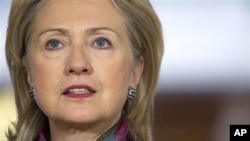U.S. diplomatic cables released by Wikileaks are accusing Saudi Arabia and several other Gulf states of being the source of funding for a number of terror groups. The cables say much of the money is donated during the Muslim pilgrimage, when it is difficult to keep track of financial transactions.
Observers continue to dissect the latest documents released by Wikileaks, among them apparent accusations by U.S. diplomats that a major source of financing for terrorist groups, including al Qaida, comes from Saudi Arabia.
Press reports say the documents also point a finger at several other Gulf states, including Qatar and Kuwait, as being lax in tracking down residents who donate money to such groups.
U.S. Secretary of State Hillary Clinton allegedly wrote in an memo that Saudi Arabia remains a critical financial support base for al Qaida, the Taliban, and other terrorist groups, including Hamas, which probably raise millions of dollars annually from Saudi sources, often during Hajj and Ramadan.
None of the documents accuse the Saudi government of supporting militant groups, and Saudi officials receive praise for significant progress in interrupting the flow of funds to al Qaida.
Political Science Professor Omar Ashour of Britain's University of Exeter says the Saudi government position is clearly against supporting terrorist groups.
"First you have to distinguish between the official Saudi Arabia and the unofficial one, and so the official stance is obviously cracking down on these groups, not supporting them, and if something became public they would not condone it," Ashour.
During the past several years the Saudi government has issue a new law, and religious authorities have also issued a fatwa, forbidding contributions to specifically named terrorist groups. But observers stress money is often raised for fictitious causes and during periods when generosity is encouraged, like Ramadan and annual pilgrimage to Mecca.
Ashour says one of the problems with the financing of many of those groups considered to be terrorist by Western governments are considered to be fighting so-called just causes in the Muslim world:
"Unofficially, most of the groups mentioned, especially Lashkar-e-Taiba [in Kashmir], and the Afghan situation, and for that matter Chechens, Palestinians- Hamas was mentioned as well, all of these are widely perceived as just causes in the Muslim majority world," added Ashour.
He also stresses that states like Kuwait and Saudi Arabia are often willing to crack down on terror financing, but that they may not always have the capacity to do so. He says each state has its own interests, and the obvious priority is protecting the internal situation and government.
University of Paris political science instructor Khattar Abou Diab thinks most Gulf states have come to realize since the terror attacks of 9/11 that they need to impose stricter controls on private sector donations.
He says leaders of Gulf states now recognize that their private sectors were handing out money in all directions in the name of Islam, without knowing where that money was going, but since the events of 9/11 the official logic of those countries has changed and controls have become more and more strict over illicit financing of terrorist groups.
Abou Diab points out accusations of financing terrorist groups are often difficult to pin down, despite good intentions. Some accusations, he notes, may even be false.
He says there have been several court cases in France against individuals who made accusations of financing terrorist groups against members of the Saudi royal family, but there was no proof and they were convicted of libel.












